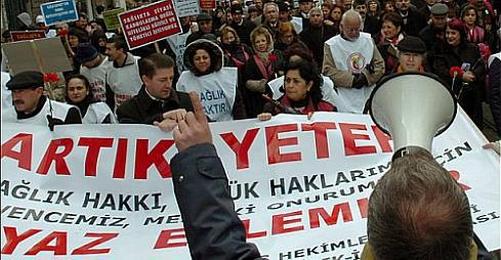Bar manager Arif Keskiner said: "This rule cannot apply to places of entertainment; in bars the rule of bars apply. Ali Met argued that the law was being considered in order to support the growing industry of products designed to help people kick the habit. Ebru Karaca, who works in advertising, was delighted: "It would be wonderful, it would be the best news of 2008:"
Steep fine for transgressions
Should the law being discussed in parliament be passed, smoking would be banned at work, at school, and in hospitals. No one would be allowed to light up in taxis or public transport, in restaurants, cafés, at association or club centres, fairs, shopping centres, weddings, conference halls, school yards or play centres.
Those violating the law would have to pay fines of up to 250,000 YTL (around 145,000 Euros).
"Impossible to enforce"
Keskiner, the owner and manager of the Cicek Bar was not pleased by the thought and believed that it would be impossible to enforce the law in bars and places of entertainment: "I can understand hospitals and schools, but it is incomprehensible why they want to forbid cigarettes in entertainment centres. They pass so many laws that they are all forgotten after three days. It might be possible to apply these laws abroad, but our society is not ready.
Keskiner argued that he had divided the bar into smoking and non-smoking zones four years ago, and that smokers should have the right to smoke as well.
"Smokers reduce my quality of life"
Karaca, a non-smoker herself, strongly dislikes the effects that the smoke of others has on her when she goes out: "I feel as if I have smoked myself, as if I am choking. The quality of life is reduced. My clothes smell of smoke."
She said that whether or not smoking was allowed at a venue: "The non-smoking tables are few in number and near the door. This is the dominance and selfishness of smokers in evidence."
"Governments often depend on tobacco industry"
Met, a heavy smoker, said: "If non-smokers are being treated unfairly, of course a ban should be applied. However, Met questioned the real motivation for the law: "In countries whose economies have a share in tobacco and cigarettes, there are no strict bans on smoking. For instance, there is no ban in some of Germany's federal states, which is unexpected. The more a country's economy depends on the tobacco industry, the more reluctant it is to apply these laws."
Met also argued that replacement products, such as electronic cigarettes, nicotine plasters and chewing gum, have been on the increase, and that these bans have benefited this sector. (EZÖ/TK/AG)










